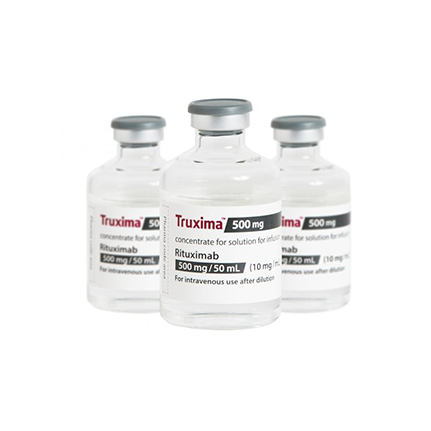- Bone Health
- Immunology
- Hematology
- Respiratory
- Dermatology
- Diabetes
- Gastroenterology
- Neurology
- Oncology
- Ophthalmology
- Rare Disease
- Rheumatology
Truxima Produces Savings and Comparable Outcomes for UK Patients With CLL, NHL
Investigators reported high overall response rates and savings of roughly $1400 per patient across cohorts.
A study of British patients with chronic lymphocytic leukemia (CLL) and non-Hodgkin lymphoma (NHL) who were treated with the rituximab biosimilar Truxima vs the originator (Rituxan) demonstrated comparable efficacy and tolerability between therapies, according to a recent study.
Investigators analyzed data from 201 patients treated by 46 UK-registered hematologists and oncologists in this retrospective survey. They evaluated charts for adult patients who received the biosimilar or originator as first-line immunotherapy between January 1, 2018, and June 30, 2019.
The use of biosimilar rituximab yielded not only comparable outcomes but also average cost savings of $1385 per patient. “These findings should inform decision makers on the potential for cost reductions where the biosimilar [Truxima] is available as a treatment alternative,” the investigators said.
They noted high overall response rates (ORRs) and 6-month progression-free survival (96%-98%) across cohorts, as well as 1-year survival of 98% to 100% across cohorts.
ORRs for patients with CLL who received Truxima vs Rituxan were 97.9% and 93.9%, respectively. For patients with NHL, the respective ORRs were 94.0% and 95.9%.
Complete response (CR) rates for patients receiving the biosimilar vs originator were 64.6% and 67.3% for CLL and 68.0% and 73.5% for NHL, respectively. Partial response rates were 33.3% and 26.5% for CLL and 26.0% and 22.4% for NHL.
Treatment discontinuations due to progression, death, or initiation of a subsequent line of therapy were 12.8% and 12.2 % for patients with CLL receiving Truxima vs Rituxan and 12.2% and 10.4% for patients in the NHL cohorts, respectively.
The investigators said 54% to 66% of patients across cohorts did not experience grade ≥ 3 adverse events (AEs); the most common grade ≥ 3 AEs were neutropenia, fatigue, anemia, and infusion reactions.
They did note high health care resource utilization, including drug costs, diagnostic testing, office visits with oncologists, and hospital admissions.
Reference
McBride A, Daniel S, Driessen MT, et al. Real-world overall response rate and other outcomes related to originator and biosimilar rituximab in patients with chronic lymphocytic leukemia or non-Hodgkin’s lymphoma in the United Kingdom. Presented at: American Society of Clinical Oncology Annual Meeting; June 3-7, 2021. Abstract e18696.
Newsletter
Where clinical, regulatory, and economic perspectives converge—sign up for Center for Biosimilars® emails to get expert insights on emerging treatment paradigms, biosimilar policy, and real-world outcomes that shape patient care.

